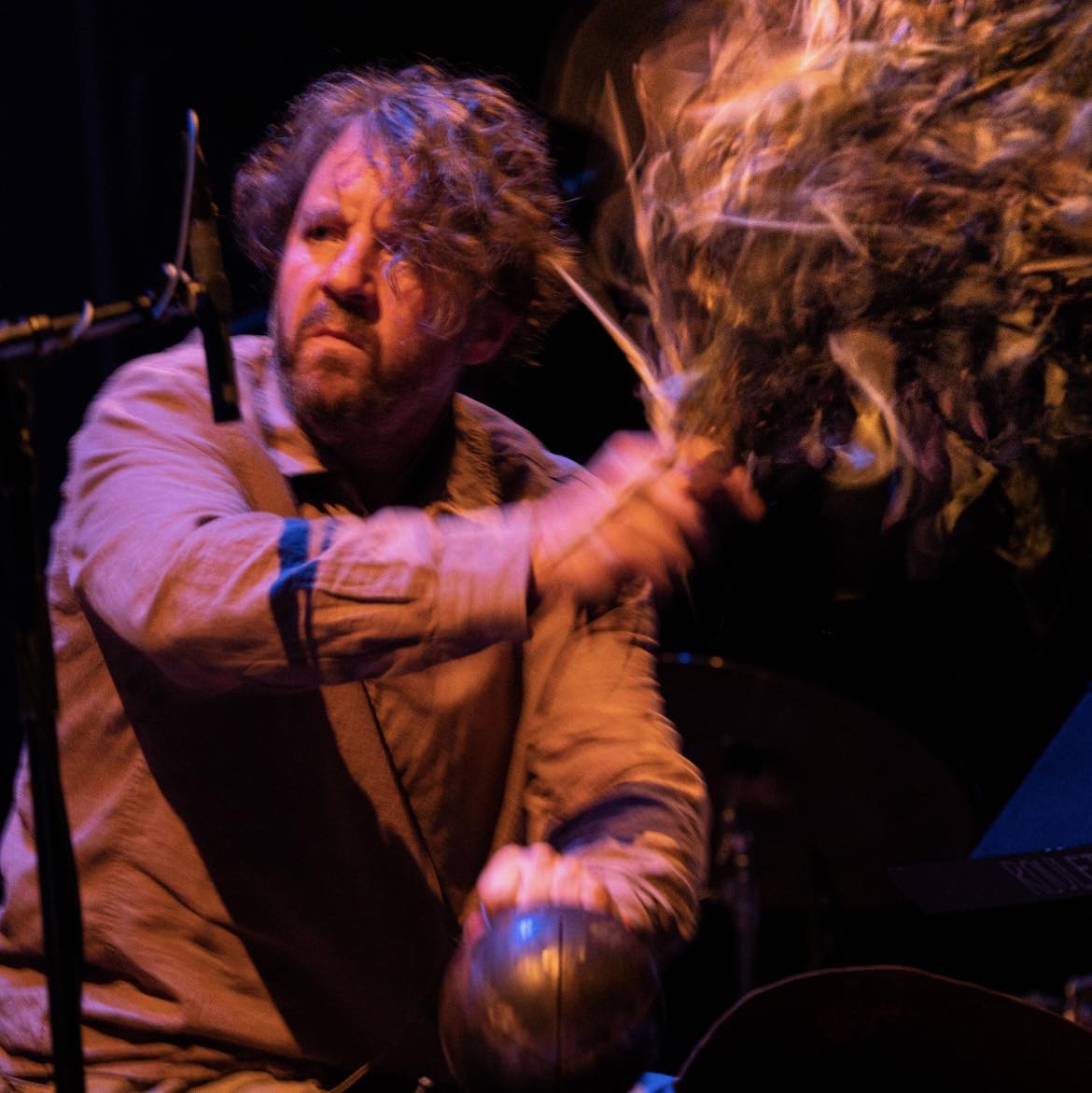Jun
15
with Bachir Attar, Billy Martin, Marc Ribot w/ Ikue Mori – (live score to Jennifer Reeves’ “Shadows Choose Their Horrors” and other shorts), Shahzad Ismaily, DJ Logic & opening set by Elliott Sharp & Bachir Attar
Sun June 15th, 2014
8:00PM
Main Space
Minimum Age: 18+
Doors Open: 7:00PM
Show Time: 8:00PM
Event Ticket: $18
Day of Show: $22
Medeski, Martin & Wood drummer Billy Martin has partnered with the Master Musicians of Jajouka and a number of notable western musicians to produce The Road to Jajouka, A benefit album with an all star international line up of some of the best cutting edge musicians of over the last 3 decades.
The Rif Mountains of Morocco hosts a small collection of tribal musicians dubbed the Master Musicians of Jajouka by western artists, but despite their obscurity, this small group has influenced popular musicians from the Rolling Stones to Ornnette Coleman. The sufi trance music they perform stretches from more than 1,000-year-old tradition, and is endangered with some of the musicians having died off and younger generations of Moroccans moving away from their mountainous home.
The Road to Jajouka live performance features the Master Musicians of Jajouka, led by Bachir Attar, along with MMW drummer Billy Martin, guitarist Marc Ribot, Dj Logic and Shahzad Ismaily on Bass.
Proceeds from the record’s sales will be used to preserve the century-old community and musical culture of the Master Musicians of Jajouka.
**************************
TABLE SEATING POLICY
Table seating for all seated shows is reserved exclusively for ticket holders who purchase “Table Seating” tickets. By purchasing a “Table Seating” ticket you agree to also purchase a minimum of two food and/or beverage items per person. Table seating is first come, first seated. Please arrive early for the best choice of available seats. Seating begins when doors open. Tables are communal so you may be seated with other patrons. We do not take table reservations.
A standing room area is available by the bar for all guests who purchase “Standing Room” tickets. Food and beverage can be purchased at the bar but there is no minimum purchase required in this area.
All tickets sales are final. No refund or credits.
1
2
The Road to Jajouka featuring The Master Musicians of Jajouka

“The music of Jajouka is trance music, ecstatic music, a music narcotic. From its source—a particular village in the southern Rif mountains of Morocco—this magical music has migrated around the world, moving like clouds, like water, like smoke-flowing through the collective consciousness of its appreciators,” writes Jim Jarmusch in the liner notes to The Road to Jajouka, a new recording that pays tribute to the legendary The Master Musicians of Jajouka led by Bachir Attar
. The collection, set for release September 10 on Howe Records, features both new performances and remixes created by western master musicians utilizing original Jajouka recordings. Produced by drummer/producer Billy Martin, the nine tracks feature guest artists including Medeski Martin & Wood, Marc Ribot, Ornette Coleman, John Zorn, Lee Ranaldo, Flea and Mickey Hart among others. All profits from album sales will benefit The Jajouka Foundation, a non-profit organization established in 2013 to foster awareness and preservation of this ancient ceremonial music.
“The music of Jajouka goes back a long way,” producer/bassist Bill Laswell said. “Paul Bowles, William S. Burroughs and Brion Gysin have all been closely associated with it, as is Ornette Coleman and The Rolling Stones. I first heard the Master Musicians on the Brian Jones record, Brian Jones Presents the Pipes of Pan at Jajouka, originally released in 1971, which was a very primitive recording. When he got back home the tapes didn’t sound the way he remembered it in his head, so he put some phasing on the tracks and that began a long history of people ‘interpreting’ the Master’s music.”
The next western musician to make the trek up to the fabled Rif mountain hilltop was free jazz alto saxophonist Ornette Coleman led by the journalist/musician Robert Palmer in January 1973. Three years later, Coleman’s album Dancing In Your Head would feature “Midnight Sunrise,” Ornette’s compelling collaboration with the Masters Musicians. “Ornette loved the music and put Jajouka on his record,” Bachir said proudly.
The fascination with “the 4000 year old rock ‘n’ roll band” (as William S. Burroughs dubbed the Masters) continued to spread over the years, to everyone from Throbbing Gristle’s Genesis P-Orridge to Debbie Harry to soprano saxophonist Steve Lacy to the Indian percussionist Talvin Singh whose 2000 release Master Musicians of Jajouka album mixed the tight mathematical rhythms of the Subcontinent with the ancient melodies of the Rif with a touch of electronic ambiance and global bass grooves.
“You have either heard of them or you haven’t,” Billy Martin explained. “Danny Blume told me the Brian Jones album was one of the first records he bought as a teenager. It was actually their connection to Ornette that brought me to their music.”
And now in 2013 the road from Jajouka continues to stretch further and further. The idea for this project grew from a friendship between Billy Martin, drummer for the exploratory jazz trio Medeski Martin and Wood, and Bachir Attar, the modern leader of the Master Musicians of Jajouka. Billy was introduced to Bachir through a mutual friend in Spain and before long they were playing shows together in the U.S. Soon thereafter Billy was invited to oversee the project that would become The Road to Jajouka. “After discovering and immersing myself in their music, I began playing along with it. I tried out different tempos, playing cross patterns. It was intense,” Billy said. “There are moments where you connect and then suddenly you find yourself lost! They might be playing in 4 and then they’re in 5. They’ve got a wide spectrum, and use multiple pulses. There are many variables and counterparts.”
Indeed, Billy’s production on this new collection creates a sonic collage of ancient and future rhythms, modern and primitive melodies. It opens with the invocation, “Hand of Fatima” by Medeski Martin & Wood, joined by Marc Ribot on guitar and banjo and Bachir Attar on lira, the ancient Berber bamboo flute passed down to him by his father, Hadj Abdessalem Attar.
On the second track, Mickey Hart, drummer/percussionist of Grateful Dead fame and author of Planet Drum, joins forces with Bronx-born turntablist DJ Logic. Entitled “Baraka,” a word that means blessing, the performance audibly evokes such sentiments.
“Djebala Hills” (in which the village of Jajouka is nestled) features East Indian singer Falu with avant-saxophonist/composer John Zorn, Billy Martin and the Red Hot Chili Pepper’s anchor Flea on bass. Flea’s bass part was recorded in London when he sat in with Ornette and the Masters at the Meltdown Festival in June 2009.
Lee Ranaldo has had a long history with Jajouka. Sonic Youth’s guitarist authored an evocative memoir of his travels in the Maghreb called Moroccan Journal: Jajouka written in September 1995. With “Boujeloudia Magick,” Ranaldo conjures his impressions of the feral goat-boy Bou Jeloud who danced to Bachir’s ancestors’ music thousands of years ago.
“Into the Rif” pairs eclectic guitarist Marc Ribot with multi-instrumentalist/producer Shazhad Ismailey alongside the Masters. “I wasn’t in the room when the basics were recorded,” Ribot recalled. “I overdubbed in my studio in Brooklyn. But it was great to work with the Jajouka musicians’ tracks, to listen closely, and play along over and over till it felt right. Their grooves are wonderful and unique and I feel like Billy and the other musicians he asked to play on these tracks took the challenge of adding to these voices seriously, as the honor and musical opportunity it was.”
“Ghaita Blues” features Bachir Attar on the piercing apricot wood folk oboe, the ghaita (also known as the rhaita), joined by Billy Martin and Ween/Marco Benevento bassist Dave Dreiwitz. “Being a lover of the band, it was thrilling to play their music. It was a life-long dream I’d never dreamt,” Dreiwitz enthused.
“Jnuin” finds Ornette Coleman reunited with Bachir Attar and the Master Musicians. Coleman’s unique approach to improvisation, dubbed “harmolodics” (part harmony/motion/melody), fits hand in kid glove with the Master’s caterwauling ghaita’s and pounding heartbeat rhythms.
“Ornette’s an angel, so pure. And he shoots a mean game of pool!” Billy laughed. “He really finds his voice in there,” Martin said of Coleman’s weaving sax. “This was the perfect collaboration!”
“Sufi Hadra” features Falu with Senegalese percussionist Aïyb Dieng and Bill Laswell. Laswell himself followed the road to Jajouka in November 1991 to record the pristine field recording Apocalypse Across The Sky.
The album’s closing track, “Al’Aita” features composer Howard Shore with the London Philharmonic Orchestra. Shore’s collaboration with Ornette Coleman on the haunting score to David Cronenberg’s 1991 adaptation of William S. Burrough’s Naked Lunch was inspired by “Midnight Sunrise.” His contribution to The Road to Jajouka comes from the score to The Cell, which featured Bachir Attar and the Master Musicians of Jajouka.
Jajouka has faced constant challenges in recent years. A few of the Master Musicians have died, others are getting on in years and are in need of health care, while many of the young men have fled the village, leaving behind the old ways in search of a modern lifestyle in Tangier and Paris. “Many people ask about the future of the village and our music, which is very good,” Bachir Attar said. “But after many thousands of years, maybe there is an end?”
In response, a clutch of concerned musicians, led by Billy Martin, have come together to do their part to help preserve and further the music, myth and magic of Jajouka. All of the musicians volunteered their time and performances to the project. The funds raised for The Jajouka Foundation with profits from album sales, and fan donations, will be used to care for the internationally celebrated Master Musicians of Jajouka led by Bachir Attar and their families for community health care and to maintain its centuries-old traditions of Jajouka.
“In Moroccan the word Jajouka means ‘good things will come to you,'” explains Billy Martin. “It seems truly prophetic in this case. The way everything fell into place for this project was truly something magical to witness and be part of.”
Jim Jarmusch concludes in The Road To Jajouka’s liner notes: “These remixed recordings are a natural transformation—welcome extensions from the branches of the tree. This is a living music and whenever I listen to its hallucinogenic properties, I too tend to believe that if the Master Musicians of Jajouka were to ever stop the flow of their magic the earth might well stop rotating on its axis, might cease to revolve around the sun…”
Bachir Attar

Billy Martin
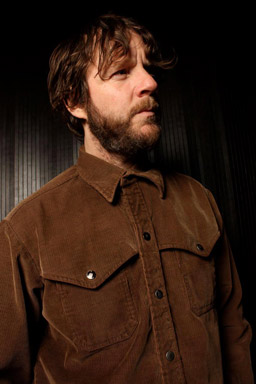
Billy Martin was born in NYC in 1963 to a Radio City Rockette and a concert violinist. At age 17, he devoted himself to music and dove into Manhattan’s thriving, eclectic musical landscape. In the years to follow, he honed his craft everywhere from Broadway orchestra pits to Brazilian nightclubs and burgeoning underground performance spaces. In the late 1980’s East Village Martin found his home (and his artistic voice) playing at the original Knitting Factory on Houston Street with John Lurie’s Lounge Lizards, The John Lurie National Orchestra, John Zorn’s Cobra ensembles, and many other musical groups.
From the roots of the downtown scene he emerged with Medeski Martin and Wood, bridging the harmonic complexity of jazz, the conversational fluency of free improvisation, and the groove and swagger of classic R&B and funk. A series of albums and high-profile collaborations with John Scofield, John Zorn, iggy Pop, Natalie Merchant, and others, brought the band international acclaim.
Martin has relentlessly pursued diverse musical contexts, from free improvisation to chamber compositions to film scores. Much of his work is available via his Amulet Records label, which recently released the Road to Jajouka—a series of collaborations (produced by Martin) between the Master Musicians of Jajouka and such artists as Ornette Coleman, Flea, Marc Ribot, John Zorn, Lee Ranaldo, Bill Laswell, Mickey Hart, MMW and more.
Martin is also an accomplished filmmaker and visual artist, whose work has been exhibited in solo and group installations around the world including 2014’s Cartegena de indias Bienal in Colombia and the Drawing Sound series at The Drawing Center in NYC (2015)
What began for Martin as tireless enthusiasm for music, percussion, and improvisation evolved into a wide ranging search for the roots of inspiration. Among the most valuable undertakings in this ongoing exploration is teaching. “When I teach,” he explains, “I learn and discover methods to build my vocabulary and style, and I love to help others do the same”
His experiences as a teacher, student, and musician led him to create and direct Life on Drums, a cinematic exploration of percussion and the creative process with his childhood drum instructor, Allen Herman.
Billy is currently Executive Artistic Director and CEO of the legendary Creative Music Studio
He also owns and manages his own record label Amulet Records
Marc Ribot w/ Ikue Mori – (live score to Jennifer Reeves’ “Shadows Choose Their Horrors” and other shorts)

Marc Ribot, who the New York Times describes as “a deceptively articulate artist who uses inarticulateness as an expressive device,” has released over 20 albums under his own name over a 30-year career, exploring everything from the pioneering jazz of Albert Ayler to the Cuban son of Arsenio Rodríguez. His latest solo release, Silent Movies (Pi Recording 2010) has been described as a “down-in-mouth-near master piece” by the Village Voice and has landed on several Best of 2010 lists including the LA Times and critical praise across the board. 2013 saw the release of “Your Turn” (Northern Spy), the sophomore effort from Ribot’s post-rock/noise trio Ceramic Dog, and 2014 saw the monumental release: “Marc Ribot Trio Live at the Village Vanguard” (Pi Recordings), documenting Marc’s first headline and the return of Henry Grimes at the historical venue in 2012 already included on Best of 2014 lists including Downbeat Magazine and NPR’s 50 Favorites.
Rolling Stone points out that “Guitarist Marc Ribot helped Tom Waits refine a new, weird Americana on 1985’s Rain Dogs, and since then he’s become the go-to guitar guy for all kinds of roots-music adventurers: Robert Plant and Alison Krauss, Elvis Costello, John Mellencamp.” Additional recording credits include Neko Case, Diana Krall, Elton John/Leon Russell’s The Union, Solomon Burke, John Lurie’s Lounge Lizards, Marianne Faithful, Joe Henry, Allen Toussaint, Medeski Martin & Wood, Caetono Veloso, Susana Baca, Allen Ginsburg, Madeline Peyroux, Nora Jones, Jolie Holland, Akiko Yano, The Black Keys, and many others. Marc works regularly with Grammy® award winning producer T Bone Burnett and NY composer John Zorn. He has also composed and performed on numerous film scores such as “Walk The Line” (Mangold), “The Kids Are All Right,” and “The Departed” (Scorcese).
“…he can sit down with just his guitar and simultaneously confound you with technique, beauty, and surprise.” – John Garratt and Will Layman, PopMatters Picks: The Best Music of 2010 for the album “Silent Movies”
Marc Ribot official site
Marc Ribot on Facebook
Marc Ribot on Twitter
Marc Ribot on Vimeo
Marc Ribot on Soundcloud
/////////////////
SHADOWS CHOOSE THEIR HORRORS
2005, 16mm to Digital Beta, 31 minutes
Directed and Edited by Jennifer Reeves
Live score by Marc Ribot
Written by Jennifer Reeves with Winsome Brown
Starring Winsome Brown, Tanya Selvaratnam and Ariane Anthony
Shadows Choose Their Horrors is the dark and melodic diary of a necromancer living on the edge between the mortal world and the realm of lost souls. Sinister forces surround Madame G (Winsome Brown) as she tries to bond with her favorite undead. Using magic and ritual to give them new life and pleasures, Madame G is shocked by the devastating outcome. This camp and experimental reworking of early silent horror was inspired by both the un-staged Aaron Copland ballet Grohg, and the film that stirred the young Copland to write his ballet, Nosferatu.
Shadows Choose Their Horrors was originally created for a live performance of Grohg by the American Symphony Orchestra at Bard Music Festival, with Leon Botstein conducting.
/////////////////
Jennifer Reeves (b. 1971, Sri Lanka) is a New York-based filmmaker working primarily on 16mm film. Reeves was named one of the “Best 50 Filmmakers Under 50” in the film journal Cinema Scope in the spring of 2012. Her films have shown extensively, from the Berlin, New York, Vancouver, London, Sundance, and Hong Kong Film Festivals to many Microcinemas in the US and Canada, the Robert Flaherty Seminar, and the Museum of Modern Art. Full multiple-screening retrospectives of her work have been held in recent years at Era New Horizons Film Festival in Wroclaw, Poland, Kino Arsenal in Berlin, Anthology Film Archives in New York, and San Francisco Cinematheque. Her most recent film COLOR NEUTRAL premiered at the New York Film Festival in October 2014.
Reeves has made experimental films since 1990. She does her own writing, cinematography, editing, and sound design. Her subjective and personal films push the boundaries of film through optical-printing and direct-on-film techniques. Reeves has consistently explored themes of memory, mental health and recovery, feminism and sexuality, landscape, wildlife, and politics from many different angles.
Since 2003 Reeves has collaborated with some of the finest composer/ musicians today, including Anthony Burr, Skúli Sverrisson, Elliott Sharp, Zeena Parkins, Marc Ribot, Erik Hoversten, Pitt Reeves, Hilmar Jensson, and Dave Cerf. As the daughter of a trumpeter, gravitating toward film and music collaborations was quite natural for Reeves. Her most ambitious film and music performance, the feature-length double-projection WHEN IT WAS BLUE (2008), premiered at Toronto International Film Festival with live music by composer/collaborator Skúli Sverrisson.
Reeves has also made a number of experimental narratives, most notably her highly acclaimed feature THE TIME WE KILLED. The Village Voice Film Critic’s poll (2005) honored THE TIME WE KILLED with votes from six film critics for categories including: Best Film, Best Cinematography, and Best Performance.
Reeves also teaches animation part-time at The Cooper Union.
Jennifer Reeves official site
Shahzad Ismaily
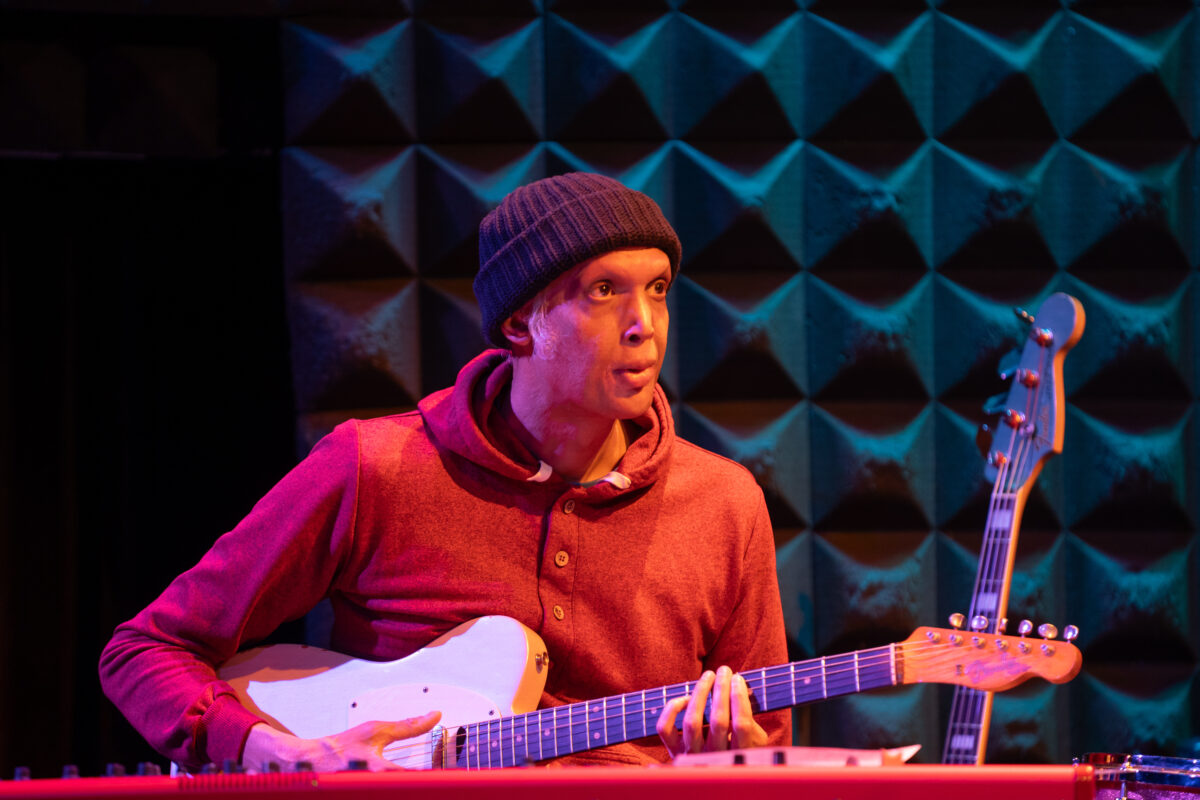
Shahzad Ismaily was born in the States to Pakistani parents who emigrated here just before his birth. He grew in a bicultural household, always following a multitude of paths and perusals. He is mostly self-taught as a musician, composer, recording engineer, and producer. He primarily plays electric bass, drums, percussion, guitar, synthesizers, and all manner of sound-makers procured in life’s travels. He has recorded and performed with a diverse crew of artMakers, Yoko Ono, Laurie Anderson, Beth Orton, Colin Stetson, Ben Frost, Bonnie Prince Billy, Damien Rice, Jolie Holland, JFDR, Secret Chiefs 3, Sam Amidon, further and further. He has been an integral member of festival/residency/collective experiences such as the People Festival (the brainchild of Bon Iver, The National, and the Michelberger), the Eau Claires festival, the Moers Festival. He has done work for dance and theater pieces, such as the film Frozen River (Oscar-nominated and Sundance award-winning), Inkboat (a butoh crew from California/Switzerland), and visual artist Laleh Khorramian. This year alone, he’ll teach in residence at BANFF, the Oklahoma Center for Contemporary Arts, the Monheim Triennale, and very happily, the Atlantic Center for the Arts. Currently based in Brooklyn and working out of the recording studio collective he founded and created, Figure 8 Recording, he has studied music extensively in Pakistan, India, Turkey, Mexico, Chile, Japan, Indonesia, Morocco, and Iceland.
DJ Logic
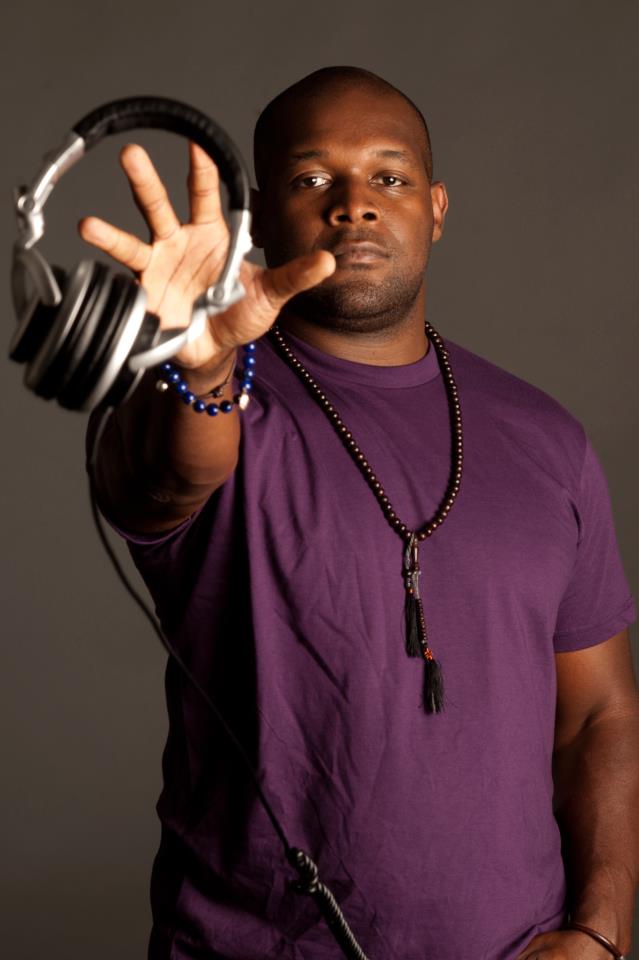
“The theorem of turntablist as musician has been long proven in the capable hands of DJ LOGIC, whom with jazz as his foundation has become a wax innovator by crossing genres and sprinkling his sound across the map. As one of the world’s most accomplished turntablist’s, DJ LOGIC is widely credited for introducing jazz into the hip – hop realms and is considered by most as a highly respected session musician and an innovative bandleader.
Since his emergence in the early nineties amidst the Bronx hip-hop scene, the New York City based deejay has been amassing a veritable mountain of collaborations ranging from the likes of: MEDESKI MARTIN AND WOOD, CHRISTIAN MCBRIDE, VERNON REID, CHARLIE HUNTER, JACK DeJOHNETTE, JOHN MAYER, BEN HARPER, MOS DEF and THE ROOTS, to name but a few.
opening set by Elliott Sharp & Bachir Attar
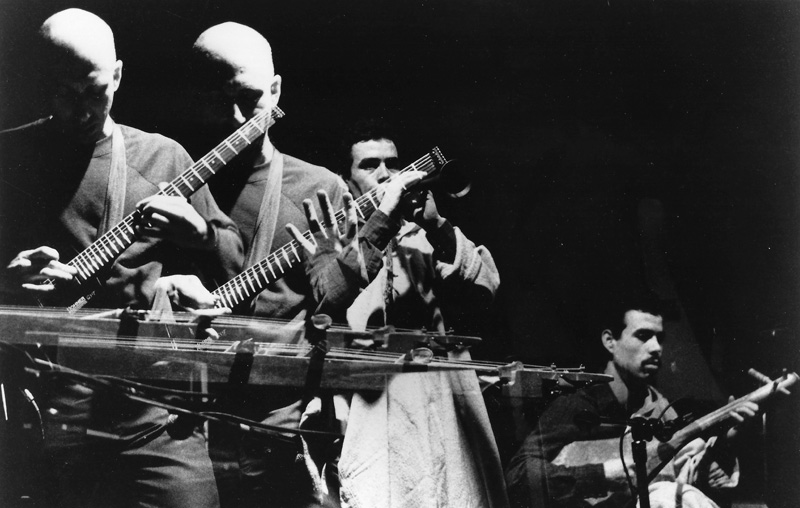
ELLIOTT SHARP is a composer, performer, and producer who leads the projects Orchestra Carbon, Aggregat, Terraplane, and Tectonics and has pioneered ways of applying fractal geometry, chaos theory, and genetics to musical composition and interaction. Sharp has composed for orchestras, string quartets, film, television, and opera. Sharp’s collaborators have included the legendary Ensemble Modern; actor Steve Buscemi; pop singer Debbie Harry; Qawwali singer Nusrat Fateh Ali Khan; JACK and Arditti string quartets; blues legends Hubert Sumlin and Pops Staples; jazz greats Jack deJohnette and Sonny Sharrock; Radio-Sinfonie Frankfurt; multimedia artists Christian Marclay and Pierre Huyghe; the Bayerische Staatsoper; and sci-fi authors Jonathan Lethem, Lucius Shephard, and Jack Womack.
Elliott Sharp official site
Bachir Attar
Bachir Attar on Wikipedia


